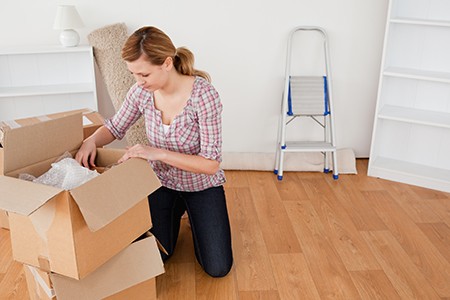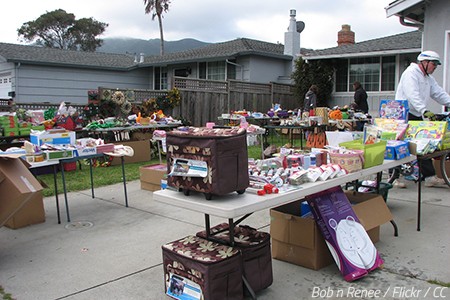 The process of moving house consists of too many move-related tasks whose timely and successful completion predetermines how your entire residential move will play out.
The process of moving house consists of too many move-related tasks whose timely and successful completion predetermines how your entire residential move will play out.
The relocation process is all about impeccable organization of the various jobs you are expected to take care of, and as you surely know by now, each stage has its signature task of monumental importance:
- Initial period – finding a top-rated mover;
- Preparation period – packing; and
- Post-move period – unpacking.
Pure logic dictates that unpacking and organizing your stuff should be done during the final stage of your relocation adventure.
Hopefully, you will have had a smooth residential move with no serious problems of any kind. And then, the moment your professional movers or your non-professional helpers (aka your friends) leave you with mountain-like piles and stacks of cardboard boxes, it’s time to turn your attention to yet another must-do marathon – UNPACKING.
Learn the best way to unpack after moving – quickly and efficiently – through expert unpacking and organizing tips that have been proven to work like a charm.
Help with unpacking after the move
Now, the first thing to ask yourself while you’re looking anxiously at all the freshly delivered moving boxes is whether or not you will need unpacking help, and if yes, then what type of unpacking assistance.
If you have to unpack quickly after moving house, then you should seriously consider hiring helpers to finish that task as fast as possible. The problem with unpacking is that, just like packing, it is one of the most time-consuming jobs that you will find in your personal moving calendar.
How long does it take to unpack after moving?
There’s hardly a unified answer to that essential question, but the case-by-case nature of moving house suggests that the unpacking time is directly influenced by
- the number of boxes to unpack and furniture pieces to unwrap, arrange, reassemble,
- the number of helpers, either professional or non-professional, and
- the presence of special items that can slow down the entire process significantly.

Unpacking should be done in a systematic manner that makes sense for you.
And that’s exactly why initiating and completing the unpacking challenge all by yourself seems to be Mission Impossible if you’re starting work in the new city in a few days’ time or if you must meet another fast-approaching deadline.
All in all, you’ve got 2 options to get helpers to unpack the boxes quickly and to put back together any furniture items you’ve taken with you. You can either reach out to any friends you may have in the new town or city, or resort to professional unpacking services.
For example, if you happen to have antique furniture pieces that are too expensive or valuable for you, or maybe ordinary furniture items that require special reassembly skills, then your best course of action is to reassess the increased risk of unpacking by yourself and contact a professional mover to learn the conditions and the charges for the unpacking service.
Once you have determined whether you’d be better off asking for timely professional or non-professional help, or whether you have the time and skills to unpack by yourself after the move, it’s time to take a look a closer look at the unpacking steps you’re recommended to follow.
Use an unpacking strategy that works for you
You shouldn’t just start opening random boxes and unpacking their content without rhyme or reason. Instead, you should follow a highly logical unpacking strategy that will increase greatly the efficiency of that major post-relocation task.
Your very first unpacking step is to inspect the delivered boxes and check them against your moving inventory or your packing list to make sure every single item is accounted for. If you do find a box or something else to be missing, then contact your movers immediately and let them know so that the issue can be resolved quickly.
After the initial inspection, it’s time to ensure that the proper containers have been carried inside their correct destination rooms, meaning that all KITCHEN labeled boxes should end up in the new kitchen. If you have used our useful advice on how to label moving boxes, the chance of unpleasant mistakes and time-wasting mix-ups will be practically zero.
Unpack all essential boxes first
The main idea behind packing essentials boxes in the first place is for them to be unpacked first as they contain nothing but life-savers. Those Open-First boxes are what will help you keep things normal right after the move, often even before the rest of your belongings have been delivered.
So, go ahead and unpack all the boxes you’ve labeled as essential. Inside you’re likely to find toiletries, medications, important hand tools, kitchen essentials, nightwear for the first night in that strange new place, some basic clothes and shoes, toys for kids or/and pets, and other miscellaneous items that you’ve packed in order to survive the first day and night in the new home.
What to Do on the First Day in a New Home
BEDROOM: Prepare the bedroom first

Unpacking advice: unpack the bedroom first.
What rooms to unpack first? Luckily, there’s a highly logical order when it comes to which rooms to unpack first, and that order states that you should unpack and prepare the rooms according to their occupational significance.
After an energy-draining moving day, there can’t be a real debate about which room should be unpacked first after a move.
A few words will probably be already flashing in your head like an emergency light (BED, SLEEP, PILLOW, and REST), thus demanding immediate action from you. One thing is clear though – you won’t be able to go through another day without a good night’s sleep, so your bedroom is definitely the first room to unpack and set up for normal occupation.
- Bed. If the bedroom of your new home is not pre-furnished with a bed, assemble the one you’ve just moved or consider getting one as your top priority.
- Mattress. Have you moved the mattress as well? If yes, then set it up without delay.
- Bed linens. Unpack all the bed linens – sheets, pillows, pillow cases, blankets, comforters, etc.
- Clothes. Unpack the clothes that you plan to wear in the very beginning and leave the rest for later. Arrange them in the clothes dresser or closet.
- Lamps. No bedroom is complete without any night lamps, so unpack those light fixtures and set them up.
BATHROOM: Get the bathroom ready for use
The good news is that the next room is pretty straightforward to unpack and get ready for use. Of course, that room is the bathroom – the very place you want to be in after the endless hours of hard move-related work.
As long as there’s running hot water, you should be fine.
- Bathroom essentials. Unpack and stock the bathroom essentials such as toilet paper, towels, soap, shampoo, toothpaste, toothbrushes, etc.
- Shower curtains. Unpack the shower curtains from the right box and hang them with priority.
- Towels. Stack up the necessary number of towels.
- Toiletries. Arrange all the toiletries and cosmetic products you will need in the very beginning.
Once you unpack the bathroom, you’re basically ready to wash away the moving day stress and accumulated dirt during the relocation trip.
KITCHEN: Unpack the kitchen next
You’re going to need free access to the new home kitchen to maintain your energy levels high during the initial post-move period. However, it’s good to know that unpacking a kitchen and making it fully operational can take days, so it’s best to unpack and set up only the absolute kitchen essentials, then and organize the rest of your kitchen little by little.
-

Unpacking and setting up the kitchen has a high priority tag attached to it, but the bedroom still remains the first room to unpack.
Major appliances. If you’ve moved any large kitchen appliances with you – like a fridge, a dishwasher, or a cooking stove, then get them unpacked and hooked up with priority. Wait at least 3-4 hours before you plug in the refrigerator so that the oil inside the cooling system can flow back to the compressor.
- Small appliances. Unpack the most frequently used small kitchen appliances such as a microwave oven, a coffee maker, a toaster, a blender, and so on. Without a doubt, the coffee maker will be heavily used during the first few days after moving into the new home.
- Various kitchen items. Remember that the kitchen is one of the most difficult rooms to unpack simply because of the sheer number of items that need to be unpacked and arranged in various kitchen cabinets, drawers, and such. Therefore, you may have to leave the kitchen partially unpacked and plan to unpack and organize it fully at a later time when you’ll be able to put in more time.
- Breakable items. Remember that all fragile kitchen items such as plates, glasses, cups, bowls, and so on will usually take longer to unpack due to the fact that you’ll need to handle them with extra care while unboxing them and arranging them where they need to go.
After you have unpacked and set up (partially) your new home’s bedroom, bathroom, and kitchen, you can follow the unpacking schedule that actually makes sense in your particular case and suits your immediate needs at the same time.
LIVING ROOM: Prepare the living room for normal occupation
The living room should be the next area to unpack and arrange while the storage areas in your new house or apartment will be the last ones to get organized after your local or cross-country move.
In most cases, the living room is the place that can wait in terms of emergency unpacking.
- Furniture items. Provided that you’ve brought some of the furniture items for the living room, then it’s time to reassemble or just arrange the couches, armchairs, tables, chairs, etc. according to the floor plan you should have of the new place.
- Electronic equipment. Unpack and hook up the most important electronic equipment pieces, such as the TV, desk computer, game console, and so on. If you took photos of the way some of those electronics were wired up, use those photographs when hooking them up to avoid possible problems.
- Lamps. Unbox any floor lamps you may have for the living room space and position them around the room using the basic principles of Feng Shui to create a cozy and pleasant atmosphere.
- Books. Books are rarely too urgent to get unpacked, so you can choose to deal with the book-filled boxes at a later time.
One of the best tips for unpacking after moving is to assess correctly how urgent each unpacking task is and to keep tackling the unpacking jobs in the order of their urgency status. As you can guess, unpacking and setting up the TV and the desktop computer is a much more pressing task than unpacking all the books you’ve moved with you.
So, when unpacking after a move, you should always be very careful how much time you invest in each unpacking task.
STORAGE AREAS: Unpack and organize all storage spaces
What to unpack last? Your unpacking checklist should inform you that the last rooms to unpack and organize after moving should be the storage areas of the house. Why? It’s simple: most storage spaces will not contain any essential items so they can be unpacked and arranged after you’re done with the high-priority rooms in the new home.
Spare rooms, garages, attics, basements, and closets are usually considered storage areas. If you do have boxes that are intended to go into storage, you don’t have to open those containers at all – just place them where you think it’s best and make sure they are labeled properly for easier identification later on.
10 Essential Things to Do After Moving
Learn how to unpack quickly after moving

Get rid of no longer needed packing materials on a regular basis to avoid cluttering up your new home.
You will soon realize that the best way to unpack after moving is to prepare a personal unpacking checklist and stick to it from Day 1.
The personalized and prioritized timeline will help you organize your time effectively and should boost your unpacking speed to the level that you need.
Pay special attention to the next fool-proof unpacking tips after moving:
Take care of your large furniture
You are strongly advised to unpack, reassemble and set up your large and heavy pieces of furniture before you get down to emptying the packed boxes. Have a good idea where you want each piece to be positioned in advance to avoid having to move it again later after it’s been assembled.
As mentioned before, this is the unpacking stage where you should definitely consider expert help.
Control the unpacking speed as you see fit
Unlike the process of packing up your home before a quickly approaching deadline (your scheduled move date), unpacking, when organized well, allows for a more stress-free experience.
In fact, you are given greater control over the unpacking speed thanks to the lack of a day or time set as your finish line. So, as long as you’ve made sure the most essential rooms are good to go, you can choose to slow down the unpacking pace in exchange for other more urgent tasks.
Moreover, some of the packed boxes can be placed temporarily in storage until a later time (usually items intended for your storage areas anyway – garage, basement, attic, etc.).
Increase greatly the unpacking speed
However, you may not actually have the luxury of unpacking at your own comfortable pace, and then you should use a few little clever tricks to boost your unpacking speed.
Here are these unpacking speed boosters in no particular order:
- Do not put off until tomorrow what you can unpack today.
- Dispose of packing materials properly and in a timely fashion to avoid perfectly avoidable delays.
- Clean up on a regular basis as you’re unpacking your rooms one by one to keep everything clean and tidy.
- Consider asking your friends for unpacking help if time really proves to be your enemy.
What to Do With Boxes After Moving
Get motivated to unpack after moving
Having gone through the crazy preparation period that included the champion of all pre-move tasks – PACKING, and then having made it through the nerve-wracking Moving day, the question of how you should maintain your motivation to unpack after moving suddenly turns out to be an excellent question.
Luckily, a great way to keep your unpacking motivation alive is to set mini goals and then reward yourself any way you deem appropriate right after you manage to complete a mini goal.
How to Overcome Relocation Depression After a Move
The post How to Unpack After Moving: Boost Your Unpacking Efficiency appeared first on The Moving Blog.







